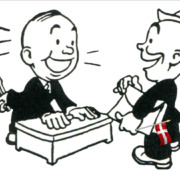Understanding your Danish boss: Less like a general, more like a sports coach
In an anti-authoritarian country like Denmark, being a boss is a precarious (social) position. Danish bosses don’t like to flaunt their authority.
In fact, when you enter a room of Danes, it is often difficult to tell which one is the boss. The social cues that point to a big cheese in other cultures – the flashy watch, the oversize office, the glamorous yet servile executive assistant – are considered poor taste in egalitarian Denmark.
So are the booming, take-charge personalities many foreigners may expect from a boss.
Denmark is a flat country. It is flat geographically, you are expected to keep a flat temperament and vocal tone, and (as they love to tell you) Danish companies have a relatively flat management structure.
This means fewer layers of people to keep an eye on you, which can be a refreshing thing, but also fewer people around to help if you’re going off the rails entirely.
Less like a general, more like a sports coach
Trying to figure out their Danish boss can be difficult for foreigners. If your culture is full of strong leaders who drive their teams forward with military bluster and precision, you may find your Danish boss passive and even difficult to respect.
A Danish boss is less like an army general and more like a sports coach. She outlines how important it is to win the game, brings in people she believes have the right qualifications, and gives them the outline of what she wants done.
Then she sets them loose on the playing field, to go do their jobs.
The secret lunchtime meeting
Not trusting employees to get the work done on their own is seen as an insult.
I saw an example of this at one of my first corporate jobs in Denmark, working as a Danish-English translator at a very large bank. One day our department head asked us to kindly let her know when we were going to lunch and when we had returned, so she could allocate resources and make sure there was coverage for urgent assignments.
This seemed reasonable to me, but my fellow translators were furious: they held a secret lunchtime meeting to discuss what they saw as an outrageous suggestion. They were not schoolchildren or factory workers, they told each other in the company canteen. They were professionals, and as long as they got their work done promptly and correctly, there was no reason to monitor when they were in the office and when they weren’t.
The boss backed down. And because in Denmark the worker’s needs are often given more consideration than the customer’s needs, any urgent translations would have to wait until the translators got back from lunch – or the boss could do them herself.
No clockwatching
In general, your Danish boss won’t monitor how much time you spend in the office. In fact, if you spend too much time there, she may worry that you can’t handle your job.
Apart from special peak periods, the general Danish attitude is that any job worth doing should be do-able in the official work week of 37.5 hours. There are no real prizes for working beyond that.
That said, when you are at work, you’re expected to give your full focus to the job, and to deliver exactly what you said you would deliver at precisely the time you promised to deliver it.
Delays and excuses are toxic in Danish business life, particularly when they arrive at the last minute. They wreak havoc with the quality and competence every Danish company likes to project.
If you’re having trouble with an assignment and don’t think you’ll be able to deliver on time, let your boss know as soon as problems begin to arise. That way she can make plans to get you some backup or move around deadlines.
Revealing at the last minute that an assignment won’t be ready on time is a recipe for a very angry Danish boss.
When your Danish boss is angry
In a flat country where you are expected to keep a flat temperament and vocal tone, anger is a slightly forbidden emotion. Like sexuality in conservative countries, it is expected to be expressed in private.
That means if your boss is angry at you, she will probably call you to a conference room and have a chat with you one-on-one. (“Hanging someone out” in front of others – or pointing out their failings while others watch – is considered extremely bad manners in Denmark. Make sure not to do it yourself when someone else on your team drops the ball.)
At any rate, the one-on-one chat with your boss is where things can go wrong.
Danish is a non-confrontational language, reflecting a non-confrontational culture. But your boss will probably not be speaking Danish to you – unless you have been in Denmark so long that you no longer need this book – which means she will no longer have access to all the respectful and softening phrases built into the Danish language.
Instead, she will be trying to express an uncomfortable emotion (anger) in a second language (English). The wording can often come out as too direct, harsh, and even rude. {Skip Bowen, another cultural trainer in Denmark, did a whole article on this entitled “Why are Danish leaders so rude?” }
Anyway, confrontations like these are when many foreigners decide they don’t like their Danish bosses, or that their Danish bosses are stubborn and inflexible.
Keep in mind that it’s difficult for Danes to reprimand people. Because that’s not equal. It makes the boss an authority figure, and this is an anti-authoritarian culture.
So spare a little sympathy for your Danish boss’s awkward situation and embarrassment at having to be the higher-up and bad guy. If you did fail to live up to expectations, admit that and work towards a solution.
In Danish culture, making a mistake is not considered shameful. Refusing to admit your mistake is.
When your boss is happy
Since doing your job well is the presumed default in Danish companies, your boss may not say all that much when she is happy with your work. Celebrating success is not a core skill in Denmark.
This can be disconcerting for foreigners, particularly Americans, who are raised on constant applause aimed at boosting their self-esteem.
In fact, you may not get any indication you’re doing well until your annual employee evaluation – standard in most corporate jobs – when your boss will be forced to fill in a lot of forms about your performance.
Otherwise, no news is generally good news. If you feel you need feedback or have something on your mind, most Danish bosses have an open door policy. You can just drop in her office for a chat or schedule 15 minutes at the end of a day to chat about how you’re doing.
There’s not as much reason to be afraid of the boss in Denmark. She – or he – will often sit with you in the company canteen at lunchtime, or share a beer with the staff after work on Friday, or even boogie down with you at the company Christmas party.
Your boss wants to see herself as part of the team. Clearly, she’s that part of the team that organizes and supervises and evaluates and makes the most money, but still just part of the team.
Equal, just like everyone else.
[icon name=”facebook-square” class=”fa-3x”] [icon name=”twitter-square” class=”fa-3x”][icon name=”instagram” class=”fa-3x”]
Buy Kay’s books about Denmark on Amazon, Saxo, Google Books, Apple Books, Barnes & Noble Nook, or via our webshop.
Image mashup copyright Kay Xander Mellish [current_year]
Read more:
Decoding your Danish pay slip and understanding your Danish taxes
How to handle a Danish business meeting
What to wear to work in Denmark: Quiet colors, quality cut and fabric
Your first day at work in Denmark: Handshakes, passwords, and several people named Mette
Trailing spouses and working in Denmark
Motivating Danish employers: Tips for foreign managers
Networking in Denmark: 5 useful tips for making Danish business contacts
Secrets of socializing with your Danish colleagues
The Danish art of taking time off
Your free daily banana and five weeks off: Job benefits in Denmark
Why job titles aren’t that important in Denmark
The Danish job interview
Job search in Denmark: Your Danish cover letter plus LinkedIn plus two magic words
Job hunting in Denmark: Putting together your Danish CV
Fine-tuning your approach to the Danish job market
Finding a job in Denmark: Some tips from my experience
Is joining a union a waste of money? And what is the difference between a union and an A-kasse?
Will I ever be promoted? Plus, how to leverage your annual review
Taking sick days in Denmark, plus how to deal with stress








I´m an Argentinian who start working in a Danish company (Niro Atomyzer in that time ) by 1976, and continue there till my retirement in 2012.
I fully agree with the note, my biggest surprise in my first visit to head offices in Copenhagen was how easy it was to arrange a meeting with your superiors, and how open they where to analyze different matters